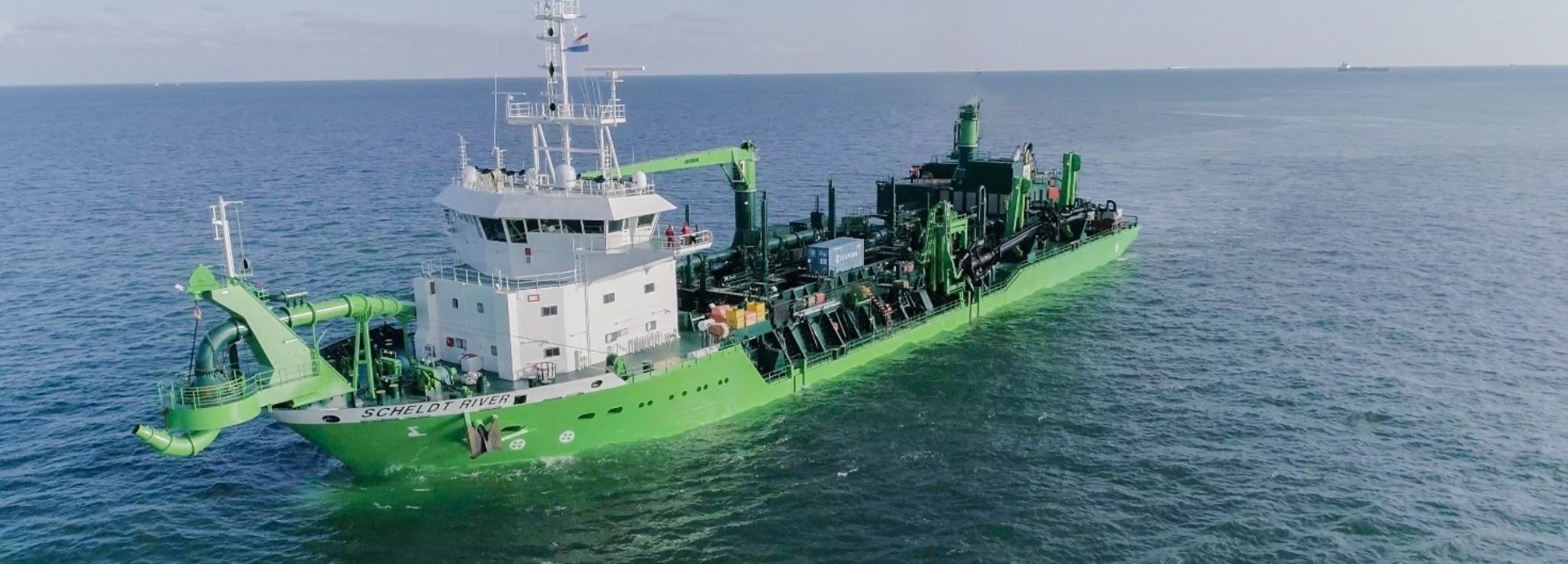

Supporting global marine solutions provider’s sustainability drive with the Wärtsilä GHG reduction package for 34DF engines
Recognising an opportunity to stay ahead of tightening emissions limits and deliver on its ambitious sustainability promises, global marine solutions provider DEME approached Wärtsilä. The resulting cooperation led to the creation of Wärtsilä’s GHG reduction package for its 34DF dual-fuel engines.
Challenge
- Need to meet DEME’s own ambitious emission reduction targets
Solution
- GHG reduction solution developed cooperatively; rigorous development and testing process
Benefit
- Strong relationship formed and emissions reduced
As a world leader in dredging, land reclamation, and offshore energy solutions with a strong global presence and a fleet of more than 100 vessels, DEME has long recognised the need to be at the forefront of sustainable technology. Project Engineer Bert
Wuyts explains: “We want to minimise our impact, and we have a clear plan to reduce our greenhouse gas (GHG) emissions by 40% by 2030 relative to 2008 levels. Since 2014 we have been investing heavily in LNG-powered vessels, and this collaboration
with Wärtsilä has helped us take our efforts to reduce our emissions a step further.”
DEME contacted Wärtsilä in 2019 to discuss the possibility of developing further GHG reductions for Scheldt River, a trailing
suction hopper dredger, and Living Stone, an offshore cable laying vessel. “These vessels have very different profiles in terms of operation, engine load and clients,” says Wuyts, “but as they are our first vessels to operate on
dual-fuel engines they were good candidates for our emerging impact reduction programme.”
Increasing DEME’s competitiveness by reducing emissions
Wanting to reduce methane slip – unburned methane that can escape into the atmosphere when burning LNG as fuel – DEME started looking at the challenge from different angles. “As a world leader in engine technology, we knew that we could
trust Wärtsilä to take their time to think about the issue and come back to us with a solid and innovative solution,” explains Wuyts. After the goals and approach were agreed on, Wärtsilä planned the software development
and engine tests. “There are always trade-offs with engine development, so we set clear boundaries. The Wärtsilä engineers kept us informed of their progress so we could see that they were working in the right direction, and the package
was delivered smoothly.”
The package is a straightforward software upgrade that significantly reduces the GHG emissions of any vessel powered by the Wärtsilä 34DF engine; the biggest GHG reductions are seen between part-load
operation and idling.
According to Wuyts, the GHG reduction package has done more than just reduce DEME’s environmental impact: “Reducing our emissions benefits our overall business performance. We have measured how competitive
our vessels’ emissions are, which positively impacts our attractiveness to clients and therefore our commercial performance, and as emissions are closely linked to fuel consumption the package has also helped us to cut our operating costs.”
Measurably fulfilling emission reduction targets
Once the upgrade had been successfully tested by Wärtsilä, the next step was for DEME to implement and test it onboard Scheldt River. “Finding the right moment was a challenge because it meant waiting for a gap in the vessel’s working
schedule,” says Wuyts. “When we did identify an opportunity just before Christmas 2020, Wärtsilä mobilised their factory personnel at very short notice so that we could do the testing while the vessel was in transit between contracts.
We were really impressed by the Wärtsilä engineers’ dedication to getting the job done during the holiday period.”
DEME conducted three tests onboard Scheldt River, one during an actual dredging project; all the tests
were verified by independent companies. “This package delivers measurable changes that bring us closer to our goals. In addition, the emission measurements have demonstrated compliance with stringent EU Stage V limits for all emissions –
we’ve found that the emission reduction at low loads is especially impressive.” Thanks to this success, DEME now plans to install the package on more of its vessels: “We’ve already completed factory tests on Spartacus and Orion,
two large LNG vessels with a different type of dual-fuel Wärtsilä engine,” concludes Wuyts.
We were very impressed with Wärtsilä’s drive and dedication to develop new technology in collaboration with us. We take our responsibility towards reducing our GHG footprint very seriously, as demonstrated by the significant investments we have made in cleaner fuel and flexible engine technology. With Wärtsilä’s support we have been able to enhance our efforts even further and make progress towards achieving our 2030 GHG emission reduction target.
Read more about the Wärtsilä GHG reduction package for 34DF engines


